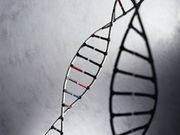AC6 gene transfer increased left ventricular function through a single administration
WEDNESDAY, March 30, 2016 (HealthDay News) — Intracoronary delivery of adenovirus 5 encoding adenylyl cyclase 6 (Ad5.hAC6) is safe for patients with heart failure and reduced ejection fraction (EF), according to a study published online March 30 in JAMA Cardiology.
H. Kirk Hammond, M.D., from the Veterans Affairs San Diego Healthcare System, and colleagues screened participants with symptomatic heart failure and EF of ≤40 percent and randomized 56 patients in a 3:1 ratio to receive one of five doses of intracoronary Ad5.hAC6 or placebo. Fourteen placebo participants were compared with 24 participants receiving the highest two doses of Ad5.hAC6 (D4 + 5).
The researchers observed no significant group differences in exercise duration at four or 12 weeks. At four weeks, but not 12 weeks, the D4 + 5 participants had increased EF. No increase in EF was seen at four or 12 weeks in the placebo group. There were no between-group differences noted in exercise duration. Increased basal left ventricular peak pressure decline was seen with AC6 gene transfer; increased arrhythmias were not seen with AC6 gene transfer. For patients with heart failure, the admission rate was 9.5 and 28.6 percent in the AC6 and placebo groups, respectively (relative risk, 0.33; 95 percent confidence interval, 0.08 to 1.36; P = 0.10).
“Larger trials are warranted to assess the safety and efficacy of AC6 gene transfer for patients with heart failure,” the authors write.
Several authors disclosed financial ties to pharmaceutical and biotechnology companies, including Renova Therapeutics, which partially funded the study.
Copyright © 2016 HealthDay. All rights reserved.








